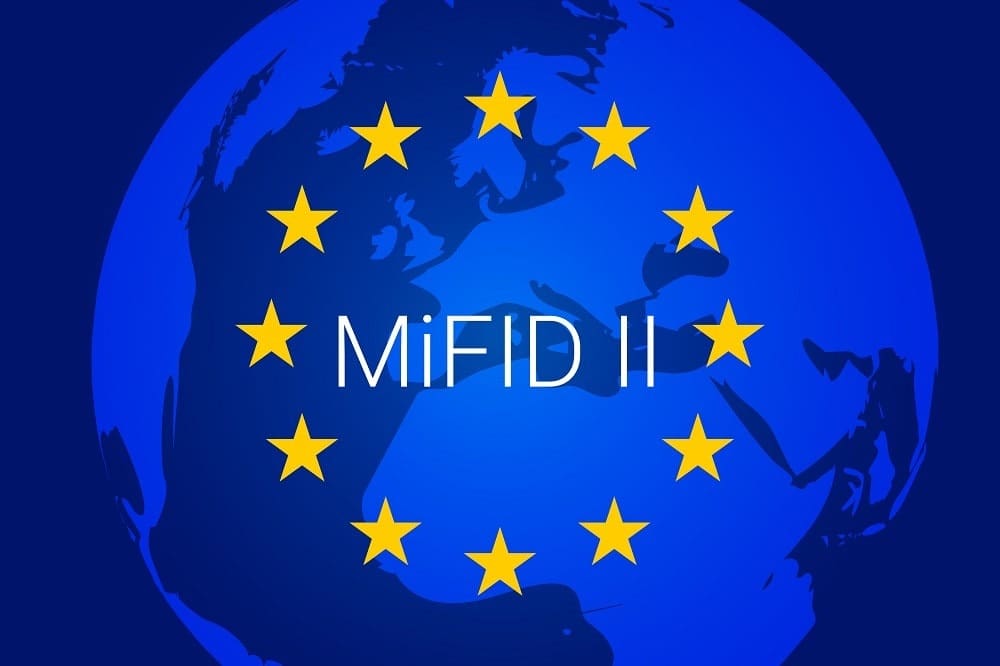MiFID II was designed to provide more protection to investors and greater transparency in Europe’s biggest capital markets. Now, two years in, what has been the impact? Fenergo’s Edel Brophy discusses fines, the affect the pandemic has had and how to navigate the changing regulatory landscape.
The Markets in Financial Instruments Directive (MiFID II) is a legislative framework introduced by the European Union (EU) as a way to regulate its financial markets and increase transparency – an initiative which was largely driven by the advances in technological change, financial instrument innovation and lack of convergence in markets and data, alongside mistrust of the financial services sector following the 2008 global financial crisis. Now in its third year, MiFID II seeks to recalibrate to ensure that financial institutions fulfill their essential mandate in financing the real economy.
The impact of the pandemic has had a severe impact on EU Member States, which led to the European Commission mobilizing a coordinated approach in response to COVID-19 and in its communication entitled “Europe’s moment: Repair and prepare for the next generation,” the Commission outlined a recovery plan for Europe, including measures aimed at kickstarting the economy and helping private investment. In addition, COVID-19 has both highlighted weaknesses some market participants have faced since the enforcement of MiFID II and surfaced challenges organizations confront in their ability to meet the cumbersome MiFID II administrative requirements. This has resulted in National Competent Authorities (NCAs) imposing 371 sanctions and measures across Europe this year – costly sanctions totaling €1,828,802, according to a report published by The European Securities and Markets Authority (ESMA), the EU’s securities markets’ regulator.
The Impact So Far
The comparison between the 2018 and 2019 ESMA reports shows an increase in the number of Member States where sanctions and measures were applied, the total number of sanctions and measures reported and the aggregated amount of administrative sanctions imposed.
Last year, Portugal became the EU/EEA Member State that imposed the biggest volume of fines under MiFID II (€750,000). Other countries with the highest number of imposed sanctions and fines include:
- the Czech Republic (€469,000; 15 and measures),
- Hungary (€244,000; 75 sanctions and measures),
- Portugal (€750,000 euros; seven sanctions and measures),
- Bulgaria (€51,000; 22 sanctions and measures) and
- Luxembourg (€50,000; 83 sanctions and measures).
However, most of these sanctions did not include a fine, and while the numbers may seem low, they don’t allow us to see the full picture just yet.
Regulators have noted that the quality and accuracy of reporting by financial institutional participants has been an issue; this is a result of the depth and breadth of the uplift from MiFID I to MiFID II, which was the most complex piece of regulation to affect European capital markets. Firms are under pressure to comply with not only reporting requirements under MiFID II, but also with transparency product governance and research unbundling.
This means that the enforcement processes can take considerable time to be implemented, as ESMA states in its report. Legislative requirements under MiFID at the union level permeate down and are then transposed into national “local” law. Next year, we expect to see a higher number of sanctions and fines published by ESMA, with more comparable information available, as at this stage, the enforcement process will be well-bedded down.
How Have the Regulatory Authorities Reacted?
The European Commission has adopted a legislative proposal for MiFID II in July, in which it highlights that “the rules on investments services can play a key role in promoting the recapitalisation of European companies as they emerge from the crisis.” The key objective in amending rules under MiFID II is to enable EU economies to weather and emerge from the pandemic under the best possible conditions and ensure market participants can fulfill their crucial function “financing the real economy.”
Among the changes under the proposal are “Amendments to Information Requirements” aimed at reducing some of the administrative burdens that financial institutions face, which include:
- a phase-out of the paper-based default method for communication,
- an exemption for eligible counterparties and professional clients from costs and charges disclosure requirements for services other than investment advice and portfolio management,
- alleviated ex-post reporting requirements,
- suspension of best execution reports
- alleviated cost-benefit analysis and
- exemption of corporate bonds with make-whole clauses from product governance.
Best Practices to Ensure MiFID II Compliance
The question becomes what can firms do in the meantime to avoid fines while navigating this evolving regulatory landscape? The answer lies in technology: Firms need to take a closer look at their existing technologies and processes and find new ways to streamline and automate to keep on top of MiFID’s exhaustive reporting requirements. To weather the pandemic, they need to leverage digitalization to manage quick, remote account opening for onboarding new clients, allowing them to transact whilst remaining fully compliant.
Furthermore, ESMA has opened a consultation paper on the Functioning of Organised Trading Facilities (OTF) for market participants to provide feedback and commentary so they can ensure they take an active role in the future of regulation. ESMA, along with the National Competent Authorities (NCAs), will also be closely monitoring the current situation and have recommended that financial market participants focus on business continuity planning, market disclosure and financial reporting during this time.
Looking Into MiFID’s Future
MiFID II has undoubtedly had a positive impact through promoting greater competition, increased transparency, tougher investor protection rules and orderly functioning markets. However, the addendum to the MiFID II framework is much needed to address a duplicitous mandate to complement the underlying principles of MiFID and address the more complex market reality we are now faced with.
Firstly, ensuring optimal market conditions for investment services – which play a critical role in promoting recapitalization of European companies – to withstand and emerge from the pandemic. Secondly, removing the operational administrative burdens financial institutions currently face that may not be strictly necessary.
Market participants will need to bring themselves up to speed with regulatory amendments to MiFID II to mobilize their operations, accommodate changes and meet their compliance requirements by leveraging technology – thus avoiding fines down the line and maintaining their reputation.



 Edel Brophy is Head of Tax and Global Regulatory Compliance at
Edel Brophy is Head of Tax and Global Regulatory Compliance at 






